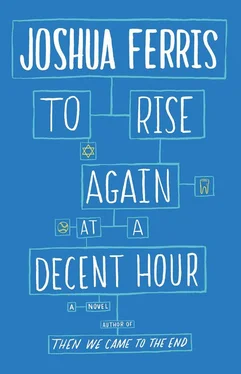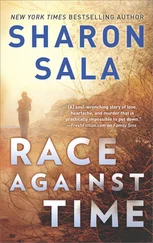Though Connie initially rolled her eyes and feigned dread when we had to spend time with her family, I gave her license to love them freely, without embarrassment, and soon enough I witnessed the special closeness between her and her mom and the tenderness that passed between her and her dad. She teased her siblings and laughed with her cousins, and she tended to her elders as if taught to do so in a small hamlet in the Pale of Settlement. But she was also fiercely protective of me, her shegetz. If she ended up marrying a non-Jew, it would not be cause for family celebration. They would accept it, just as they had “accepted” Connie’s secularizing, but they would hold out hope that we would move closer to Judaism and that I would convert — which I never would, of course, because I didn’t believe in God. For my part, I refrained from insulting them with cold declarations of my atheism, as I had failed to do with the Santacroces, because I loved them. I tried not to let on that I loved them, both because I didn’t want to look desperate in Connie’s eyes, and because I thought it was a kind of sickness in me, how I always fell in love with the close-knit and conservative families of the girls who stole my heart. I was tired of putting myself at the mercy of these unsuspecting recipients of irrational love. I wanted to be one of those criminal-looking boyfriends put-upon at family gatherings for having to take part. Dudes like that basked in a cool reticence and never gave a damn what was being said behind their backs, and the girls loved them all the more for it. If I managed not to wear that goofy smile of mine whenever a Plotz opened his or her mouth, if I refrained from laughing the loudest at their witticisms, and if I resisted the urge to send gifts in the mail following a gathering, I could never be that shining example of male surliness. Irrepressible enthusiasm still made me feel like a happy whore at the Plotz dinner table. Womanish tears still spilled out during Connie’s sister’s wedding. I still got drunk at the wedding feast and went from Plotz to Plotz telling this one how much I liked her shoes and that one how impressed I was with his medical-supply business. I danced the hora, the traditional celebration dance in which the bride and groom are lifted into the air on chairs and dipped up and down on a tide of dancers. I really got in there, I really lifted the groom’s chair (I hardly knew the groom) and went round and round the room and had a blast.
When the dance ended, I couldn’t find Connie, so I got another drink and sat down to take a breather. Her uncle Stuart came up to me. “Hey, Stu,” I said. I instantly regretted it. To call such a man Stu! I had this obnoxious tendency of shortening certain men’s names in a transparent bid to fast-track a friendship. It was never the name that prompted it, but the man who bore the name. Connie’s uncle Stuart was small in stature but loomed large in the room. He was quiet by nature, but when he spoke he was heard. The eldest brother, the patriarch, the leader of the Passover service.
Now, maybe my calling him Stu didn’t have a thing to do with what happened next. Maybe he overheard some of the compliments I had paid Connie’s relatives throughout the night and found them excessive. Or maybe he just didn’t care for my abandon out on the dance floor. He sat down at the table, keeping a chair between us, and leaned in slowly. I had no prior evidence that he had so much as noticed me.
“Do you know what a philo-Semite is?” he asked.
I said, “Someone who loves Jewish people?”
He nodded slowly. His yarmulke, arced far back on his thinning hair, adhered to his head as if by magic. “Do you want to hear a joke?”
I didn’t consider him the sort of man who would tell a joke. Maybe he knew I liked jokes?
“Sure,” I said. “I’d love to.”
He looked at me a long time before beginning, so long that, in memory, the blaring music faded to near inaudibility, and his eyes eclipsed the light.
“A Jew is sitting at a bar when a Jew-hater and a Jew-lover walk in,” he said at last. “They have a seat on either side of the Jew. The Jew-hater tells the Jew that he’s been arguing with the philo-Semite about which of the two of them the Jew prefers. The Jew-hater believes the Jew prefers him over the philo-Semite. The philo-Semite can’t believe that. How can the Jew prefer somebody who hates the Jews with a murderous passion over someone who throws his arms open for every Jew he meets? ‘So what do you say,’ says the Jew-hater. ‘Can you settle this for us?’ And the Jew turns to the philo-Semite, jerks his thumb back at the Jew-hater, and says, ‘I prefer him. At least I know he’s telling the truth.’ ”
Uncle Stuart didn’t laugh at the conclusion of his joke. He didn’t even crack a smile. My laughter, which was excessive but almost entirely polite, stuck in my throat as he got up and left the table.
“Why me?”
“She says it’s not something Jesus would say,” I said. “She thinks it’s a Jewish thing.”
“A Jewish thing?”
“Something from the Old Testament.”
“Well, if it’s a Jewish thing,” she said, “it must be me, right? I mean, I am the Jew here.”
“Will you please just take another look and tell me if you think it’s from the Old Testament?”
“I have the Bible memorized?”
“You had how many years of Hebrew school?” I said.
“And look where it got me: to this great think tank dedicated to all things Hebraic.”
“Connie,” I said. “Please.”
She took another look at the passage.
“Still sounds to me like one of those ass-backward things Christ is always saying to make the people go ‘Ohh, ahh, wow,’ ” she said. “But who knows. Maybe it is a Jewish thing. Why don’t you Google it?”
Connie was a big one for Googling things. It helped out enormously with all sorts of crises and brought relief to the most pressing concerns. At a restaurant, the two of us would momentarily forget the difference between rigatoni and penne, and she would Google “difference between rigatoni and penne” and provide us the answer. We no longer had to listen to the idiosyncratic replies of the waitstaff on the differences between rigatoni and penne, which were always so full of human approximations and stabs at essences. We had hard definitions straight from the me-machine. Or while we were drinking our wine, I might ask Connie, who knew more about wine than I did, “Do white wines need time to breathe like red wines?” She wouldn’t know the answer, or had known it at one time but had forgotten it and now needed to know it again very badly, so she’d look it up right then and there, at the dinner table, while I waited, and learn not only about aeration effects on white wines but also quite a lot about grapes, tannins, and oxidation techniques — random snippets of which, with her eyes cast down on the phone, she would share with me across the table, distractedly and never coherently. She’d also forget who starred in what, who sang this or that, and if so-and-so was still dating so-and-so, and for those things, too, she’d abandon our conversation to secure the answer. She no longer lived in a world of speculation or recall and would take nothing on faith when the facts were but a few clicks away. It drove me nuts. I was sick to death of having as my dinner companions Wikipedia, About.com, IMDb, the Zagat guide, Time Out New York, a hundred Tumblrs, the New York Times, and People magazine. Was there not some strange forgotten pleasure in reveling in our ignorance? Couldn’t we just be wrong? We fought about that goddamn me-machine more than we fought about where to go and what to do, sex and its frequency, my so-called addiction to the Red Sox, and a million other things combined. (With the exception of kids. We fought most about kids.) I’d had enough and would say things like “The moon is really just a weak star” or “Flour tortillas have ganja in them” or “My favorite Sean Penn movie is Forrest Gump ” and then really dig in until she’d Google it and waggle the screen before my eyes as if the thing itself were saying na na na na na , and I’d say, “Tom Hanks my ass! It was Sean Penn!” and she’d say, “It’s right fucking here, look! Tom Hanks ,” and I’d say, “I can’t believe you needed the Internet for that!” and the night would descend from there.
Читать дальше












